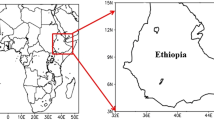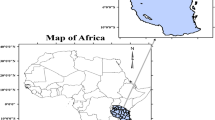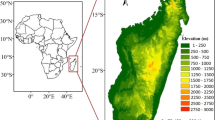Abstract
The present study investigates the interdecadal modulations of interannual variability in the Indo-western Pacific Ocean Capacitor (IPOC) mode and its influence on the Indian summer monsoon (ISM) rainfall during 1886–2014. The IPOC mode is extracted using singular value decomposition (SVD) analysis of tropical Indian Ocean (TIO) sea surface temperature (SST) and western North Pacific (WNP) 850 hPa relative vorticity anomalies during the boreal summer season (June to August; JJA). Analysis suggests that the IPOC mode induces a southwest-northeast dipole pattern in the Indian subcontinent rainfall with significant positive anomalies over the southern peninsular India and negative anomalies over the eastern parts of the Indo-Gangetic plains during the positive phase of IPOC. The 21-year sliding correlation coefficients between rainfall dipole index and leading principal component of SVD analysis (SVD-PC1) suggest that IPOC and ISM rainfall relationship exhibits significant interdecadal variability during the study period. The entire period has been divided into three distinct epochs as 1895–1926 (epoch-1), 1932–1972 (epoch-2) and 1976–2007 (epoch-3) based on 21-year sliding correlation. It is found that the IPOC mode strongly affect ISM rainfall in epoch-1 and epoch-3, whereas this relationship between the IPOC mode and ISM rainfall is inadequate in epoch-2 pertaining to the absence of the dipole rainfall pattern. The mechanisms responsible for such epochal changes in relationship between IPOC mode and ISM rainfall are discussed. In epoch-1 and epoch-3, anomalous TIO SST and the Pacific–Japan (PJ) pattern/WNP circulation both are well organized as part of the IPOC mode. However, in epoch-2 vigorous warm SSTs over the equatorial central Pacific and cyclonic circulation over the north Pacific accompanied by SST cooling around 40°N are noticed. The north Pacific cyclonic circulation accelerates the southwesterlies emerging from north-western flank of WNP anticyclone. On the other hand, positive SST anomalies and associated low-level convergence in central equatorial Pacific limit the extension of northeasterlies from the southern edge of WNP anticyclone to TIO. As a result, WNP anticyclone is squeezed/twisted between them, thereby weakening and shifting it northeastward. This in turn weakens the PJ mode and the inter-basin interaction of WNP circulation and TIO SSTs, causing disorganized IPOC pattern in epoch-2.













Similar content being viewed by others
References
Ashok K, Guan Z, Yamagata T (2001) Impact of the Indian Ocean Dipole on the relationship between the Indian monsoon rainfall and ENSO. Geophys Res Lett 28(23):4499–4502. https://doi.org/10.1029/2001gl013294
Ashok K, Behera SK, Rao SA, Weng H, Yamagata T (2007) El Niño Modoki and its possible teleconnection. J Geophys Res 112:C11007. https://doi.org/10.1029/2006JC003798
Chakravorty S, Chowdary JS, Gnanaseelan C (2013) Spring asymmetric mode in the tropical Indian Ocean: role of El Niño and IOD. Clim Dyn 40:1467–1481. https://doi.org/10.1007/s00382-012-1340-1
Chakravorty S, Gnanaseelan C, Chowdary JS, Luo JJ (2014) Relative role of El Niño and IOD forcing on the southern tropical Indian Ocean Rossby waves. J Geophys Res 119:5105–5122. https://doi.org/10.1002/2013JC009713
Chowdary JS, Gnanaseelan C, Xie SP (2009) Westward propagation of barrier layer formation in the 2006–07 Rossby wave event over the tropical southwest Indian Ocean. Geophys Res Lett 36(4):L04607. https://doi.org/10.1029/2008GL036642
Chowdary JS, Gnanaseelan C, Chakravorty S (2013) Impact of Northwest Pacific anticyclone on the Indian summer monsoon region. Theor Appl Climatol 113(1-2):329–336. https://doi.org/10.1007/s00704-012-0785-9
Chowdary JS, Harsha H, Gnanaseelan C, Srinivas G, Parekh A, Pillai P, Naidu C (2017) Indian summer monsoon rainfall variability in response to differences in the decay phase of El Niño. Clim Dyn 48(7–8):2707–2727. https://doi.org/10.1007/s00382-016-3233-1
Chowdary JS, Patekar DD, Srinivas G, Gnanaseelan C, Parekh A (2019) Impact of the Indo-Western Pacific Ocean Capacitor mode on South Asian summer monsoon rainfall. Clim Dyn 53(3–4):2327–2338. https://doi.org/10.1007/s00382-019-04850-w
Compo GP, Whitaker JS, Sardeshmukh PD, Matsui N, Allan RJ, Yin X, Gleason BE, Vose RS, Rutledge G, Bessemoulin P, Brönnimann S, Brunet M, Crouthamel RI, Grant AN, Groisman PY, Jones PD, Kruk M, Kruger AC, Marshall GJ, Maugeri M, Mok HY, Nordli Ø, Ross TF, Trigo RM, Wang X, Woodruff SD, Worley SJ (2011) The twentieth century reanalysis project. Q J R Meteor Soc 137:1–28. https://doi.org/10.1002/qj.776
Dai A, Fung IY, Del Genio AD (1997) Surface observed global land precipitation variations during 1900–1988. J Clim 10:2943–2962. https://doi.org/10.1175/1520-0442(1997)010%3c2943:SOGLPV%3e2.0.CO;2
Deser C, Timlin MS (1997) Atmosphere–ocean interaction on weekly timescales in the North Atlantic and Pacific. J Clim 10(3):393–408. https://doi.org/10.1175/1520-0442(1997)010%3c0393:aoiowt%3e2.0.co;2
Du Y, Xie S-P, Huang G, Hu KM (2009) Role of air-sea interaction in the long persistence of El Niño-induced North Indian Ocean warming. J Clim 22(8):2023–2038. https://doi.org/10.1175/2008jcli2590.1
Fan F, Mann ME, Lee S, Evans JL (2010) Observed and modeled changes in the South Asian summer monsoon over the historical period. J Clim 23(19):5193–5205. https://doi.org/10.1175/2010JCLI3374.1
Gadgil S, Gadgil S (2006) The Indian monsoon, GDP and agriculture. Econ Polit Wkly 41(47):4887–4895. https://www.jstor.org/stable/4418949
Gill AE (1980) Some simple solutions for heat-induced tropical circulation. Q J R Meteorol Soc 106(449):447–462. https://doi.org/10.1002/qj.49710644905
Grove RH (1998) Global impact of the 1789–93 El Niño. Nature 393(6683):318–319. https://doi.org/10.1038/30636
Harris I, Jones P, Osborn T, Lister D (2014) Updated high resolution grids of monthly climatic observations—the CRU TS3.10 dataset. Int J Climatol 34:623–642. https://doi.org/10.1002/joc.3711
Hu K, Huang G, Qu X, Huang R (2012) The impact of Indian Ocean variability on high temperature extremes across south of Yangtze River Valley in late summer. Adv Atmos Sci 29:91–100. https://doi.org/10.1007/s00376-011
Hu K, Huang G, Zheng X-T, Xie S-P, Qu X, Du Y, Liu L (2014) Interdecadal variations in ENSO influences on northwest Pacific-East Asian early summertime climate simulated in CMIP5 models. J Clim 27(15):5982–5998. https://doi.org/10.1175/JCLI-D-13-00268.1
Hu K, Xie S-P, Huang G (2017) Orographically anchored El Niño effect on summer rainfall in Central China. J Clim 30:10037–10045. https://doi.org/10.1175/JCLI-D-17-0312.1
Huang R, Sun F (1992) Impacts of the tropical Western Pacific on the East Asian summer monsoon. J Meteor Soc Jpn Ser II 70(1B):243–256. https://doi.org/10.2151/jmsj1965.70.1B243
Huang G, Hu KM, Xie S-P (2010) Strengthening of tropical Indian Ocean teleconnection to the Northwest Pacific since the Mid-1970s: an atmospheric GCM study. J Clim 23:5294–5304. https://doi.org/10.1175/2010JCLI3577.1
Kawamura R, Matsuura T, Iizuka S (2001) Role of equatorially asymmetric sea surface temperature anomalies in the Indian Ocean in the Asian summer monsoon and El Niño-Southern Oscillation coupling. J Geophys Res Atmos 106(D5):4681–4693. https://doi.org/10.1029/2000JD900610
Kosaka Y, Nakamura H (2010) Mechanisms of meridional teleconnection observed between a summer monsoon system and a subtropical anticyclone. Part I: THE Pacific–Japan pattern. J Clim 23(19):5085–5108. https://doi.org/10.1175/2010JCLI3413.1
Kosaka Y, Xie S-P, Lau N-C, Vecchi GA (2013) Origin of seasonal predictability for summer climate over the Northwestern Pacific. Proc Natl Acad Sci USA 110(19):7574–7579. https://doi.org/10.1073/pnas.1215582110
Krishnamurthy V, Goswami BN (2000) Indian monsoon–ENSO relationship on interdecadal timescale. J Clim 13(3):579–595. https://doi.org/10.1175/1520-0442(2000)013%3c0579:IMEROI%3e2.0.CO;2
Kubota H, Kosaka Y, Xie S-P (2016) A 117-year long index of the Pacific–Japan pattern with application to interdecadal variability. Int J Climatol 36(4):1575–1589. https://doi.org/10.1002/joc.4441
Kug J-S, Choi J, An S-I, Jin F-F, Wittenberg AT (2010) Warm pool and cold tongue El Niño events as simulated by the GFDL 2.1 coupled GCM. J Clim 23(5):1226–1239. https://doi.org/10.1175/2009JCLI3293.1
Kumar KK, Rajagopolan B, Cane MA (1999) On the weakening relationship between the Indian monsoon and ENSO. Science 284(5423):2156–2159. https://doi.org/10.1126/science.284.5423.2156
Li J, Xie S-P, Cook ER, Huang G, D’Arrigo R, Liu F, Ma J, Zheng X (2011) Interdecadal modulation of El Niño amplitude during the past millennium. Nat Clim Change 1(2):114–118. https://doi.org/10.1038/nclimate1086
Lu B, Jin F-F, Ren H-L (2018) A coupled dynamic index for ENSO periodicity. J Clim 31(6):2361–2376. https://doi.org/10.1175/jcli-d-17-0466.1
Maity R, Kumar DN (2006) Bayesian dynamic modelling for monthly Indian summer monsoon rainfall using El Niño-Southern Oscillation (ENSO) and Equatorial Indian Ocean Oscillation (EQUINOO). J Geophys Res 111:D07104. https://doi.org/10.1029/2005JD006539
Masumoto Y, Meyers G (1998) Forced Rossby waves in the southern tropical Indian Ocean. J Geophys Res 103(C12):27589–27602. https://doi.org/10.1029/98JC02546
Matsuno T (1966) Quasi-geostrophic motions in the equatorial area. J Meteor Soc Jpn 44(1):25–43. https://doi.org/10.2151/jmsj1965.44.1_25
Mehta VM, Lau K-M (1997) Influence of solar irradiance on the Indian monsoon–ENSO relationship at decadal-multidecadal timescales. Geophys Res Lett 24(2):159–162. https://doi.org/10.1029/96GL03778
Mishra V, Smoliak BV, Lettenmaier DP, Wallace JM (2012) A prominent pattern of year-to-year variability in Indian summer monsoon rainfall. Proc Natl Acad Sci USA 109(19):7213–7217. https://doi.org/10.1073/pnas.1119150109
New M, Hulme M, Jones P (2000) Representing twentieth-century space-time climate variability. Part II: development of 1901–96 monthly grids of terrestrial surface climate. J Clim 13:2217–2238. https://doi.org/10.1175/1520-0442(2000)013%3c2217:RTCSTC%3e2.0.CO;2
Nitta T (1986) Long-term variations of cloud amount in the western Pacific region. J Meteor Soc Jpn 64(3):373–390. https://doi.org/10.2151/jmsj1965.64.3_373
Nitta T (1987) Convective activities in the tropical western Pacific and their impact on the Northern Hemisphere summer circulation. J Meteor Soc Jpn 65(3):373–390. https://doi.org/10.2151/jmsj1965.65.3_373
Pai DS, Sridhar L, Badwaik MR, Rajeevan M (2015) Analysis of the daily rainfall events over India using a new long period (1901–2010) high resolution (0.25° × 0.25°) gridded rainfall data set. Clim Dyn 45(3–4):755–776. https://doi.org/10.1007/s00382-014-2307-1
Park H-S, Chiang JCH, Lintner BR, Zhang GJ (2010) The delayed effect of major El Niño events on Indian monsoon rainfall. J Clim 23:932–946. https://doi.org/10.1175/2009jcli2916.1
Perigaud C, Delecluse P (1993) Interannual sea level variations in the tropical Indian Ocean from geosat and shallow water simulations. J Phys Oceanogr 23:1916–1934. https://doi.org/10.1175/1520-0485(1993)023%3c1916:ISLVIT%3e2.0.CO;2
Rajeevan M, Bhate J, Kale JD, Lal B (2006) High resolution daily gridded rainfall data for the Indian region: analysis of break and active monsoon spells. Curr Sci 91(3):296–306
Rasmusson EM, Carpenter TH (1983) The relationship between eastern equatorial Pacific sea-surface temperatures and rainfall over India and Sri Lanka. Mon Weather Rev 111:517–528. https://doi.org/10.1175/1520-0493(1983)111%3c0517:TRBEEP%3e2.0.CO;2
Ropelewski CF, Halpert MS (1987) Global and regional scale precipitation patterns associated with the El Niño/Southern Oscillation. Mon Weather Rev 115:1606–1626. https://doi.org/10.1175/1520-0493(1987)115%3c1606:GARSPP%3e2.0.CO;2
Smith TM, Reynolds RW, Peterson TC, Lawrimore J (2008) Improvements to NOAA’s historical merged land–ocean surface temperature analysis (1880–2006). J Clim 21:2283–2296. https://doi.org/10.1175/2007jcli2100.1
Srinivas G, Chowdary JS, Kosaka Y, Gnanaseelan C, Parekh A, Prasad KV (2018) Influence of the Pacific–Japan pattern on Indian summer monsoon rainfall. J Clim 31:3943–3958. https://doi.org/10.1175/JCLI-D-17-0408.1
Sun Y, Xu HM, Deng JC (2014) Interdecadal variation in Pacific–Japan teleconnection patterns and possible causes (in Chinese). Chin J Atmos Sci 38(6):1055–1065
Tao L, Li T, Ke Y, Zhao J (2017) Causes of interannual and interdecadal variations of the summertime Pacific–Japan-like pattern over East Asia. J Clim 30(22):8845–8864. https://doi.org/10.1175/JCLI-D-15-0817.1
Tokinaga H, Tanimoto Y, Deser C, Kosaka Y, Okumura YM (2012a) Slowdown of the Walker circulation driven by tropical Indo-Pacific warming. Nature 491:439–443. https://doi.org/10.1038/nature11576
Tokinaga H, Tanimoto Y, Timmermann A, McGregor S, Ogata T, Kubota H, Okumura YM (2012b) Regional patterns of tropical Indo-Pacific climate change: evidence of the Walker circulation weakening. J Clim 25:1689–1710. https://doi.org/10.1175/JCLI-D-11-00263.1
Ueda H, Matsumoto J (2000) A possible triggering process of east-west asymmetric anomalies over the Indian Ocean in relation to 1997/98 El Niño. J Meteor Soc Jpn 78(6):803–818. https://doi.org/10.2151/jmsj1965.78.6_803
Walker GT (1924) Correlation in seasonal variations of weather. IV: a further study of world weather. Mem Indian Meteorol Dep 24:275–332. https://doi.org/10.1175/1520-0493(1925)53%3c252:CISVOW%3e2.0.CO;2
Wallace JM, Smith C, Bretherton CS (1992) Singular value decomposition of wintertime sea surface temperature and 500-mb height anomalies. J Clim 5:561–576. https://doi.org/10.1175/1520-0442(1992)005%3c0561:svdows%3e2.0.co;2
Wang B (2006) The Asian monsoon. Springer, New York, p 787
Wang B, An SI (2002) A mechanism for decadal changes of ENSO behavior: roles of background wind changes. Clim Dyn 18:475–486. https://doi.org/10.1007/s00382-001-0189-5
Wang B, Wu R, Lukas R (1999) Roles of the Western North Pacific wind variation in thermocline adjustment and ENSO phase transition. J Meteor Soc Jpn 77(1):1–16. https://doi.org/10.2151/jmsj1965.77.1_1
Wang B, Wu RG, Fu XH (2000) Pacific-East Asian teleconnection: how does ENSO affect East Asian climate? J Clim 13(9):1517–1536. https://doi.org/10.1175/1520-0442(2000)013%3c1517:PEATHD%3e2.0.CO;2
Wang B, Wu RG, Li T (2003) Atmosphere-warm ocean interaction and its impacts on Asian–Australian monsoon variation. J Clim 16(8):1195–1211. https://doi.org/10.1175/1520-0442(2003)16%3c1195:AOIAII%3e2.0.CO;2
Webster PJ, Yang S (1992) Monsoon and ENSO: selectively interactive systems. Q J R Meteorol Soc 118(507):877–926
Webster PJ, Magana VO, Palmer TN, Shukla J, Tomas RA, Yanai MU, Yasunari T (1998) Monsoons: processes, predictability, and the prospects for prediction. J Geophys Res 103(C7):14451–14510. https://doi.org/10.1029/97JC02719
Wu R, Kirtman BP, Krishnamurthy V (2008) An asymmetric mode of tropical Indian Ocean rainfall variability in boreal spring. J Geophys Res 113(D5):D05104. https://doi.org/10.1029/2007JD009316
Wu B, Zhou T, Li T (2009) Contrast of rainfall–SST relationships in the WesternNorth Pacific between the ENSO-developing and ENSO-decaying summers. J Clim 22:4398–4405. https://doi.org/10.1175/2009JCLI2648.1
Wu B, Li T, Zhou T (2010) Relative contributions of the Indian Ocean and local SST anomalies to the maintenance of the western North Pacific anomalous anticyclone during the El Niño decaying summer. J Clim 23:2974–2986. https://doi.org/10.1175/2010JCLI3300.1
Xie S-P, Annamalai H, Schott FA, McCreary JP Jr (2002) Structure and mechanisms of South Indian Ocean climate variability. J Clim 15:864–878. https://doi.org/10.1175/1520-0442(2002)015%3c0864:samosi%3e2.0.co;2
Xie S-P, Hu KM, Hafner J, Tokinaga H, Du Y, Huang G, Sampe T (2009) Indian Ocean capacitor effect on Indo-western Pacific climate during the summer following El Niño. J Clim 22(3):730–747. https://doi.org/10.1175/2008JCLI2544.1
Xie S-P, Du Y, Huang G, Zheng X-T, Tokinaga H, Hu K, Liu Q (2010) Decadal shift in El Niño influences on Indo-western Pacific and East Asian climate in the 1970s. J Clim 23(12):3352–3368. https://doi.org/10.1175/2010JCLI3429.1
Xie S-P, Kosaka Y, Du Y, Hu K, Chowdary JS, Huang G (2016) Indo-western Pacific ocean capacitor and coherent climate anomalies in post-ENSO summer: a review. Adv Atmos Sci 33(4):411–432. https://doi.org/10.1007/s00376-015-5192-6
Yang JL, Liu QY, Xie S-P, Liu ZY, Wu LX (2007) Impact of the Indian Ocean SST basin mode on the Asian summer monsoon. Geophys Res Lett 34(2):L02708. https://doi.org/10.10029/2006GL028571
Zhou Z, Zhang R, Xie S-P (2019) Interannual variability of summer surface air temperature over central India: implications for monsoon onset. J Clim 32(6):1693–1706. https://doi.org/10.1175/JCLI-D-18-0675.1
Acknowledgements
We thank the Director, Earth System Sciences Organization (ESSO)—Indian Institute of Tropical Meteorology (IITM) for financial support and infrastructure. We thank the anonymous reviewers for the comments which helped us to improve the manuscript. Ferret is used for preparing manuscript figures.
Author information
Authors and Affiliations
Corresponding author
Additional information
Publisher's Note
Springer Nature remains neutral with regard to jurisdictional claims in published maps and institutional affiliations.
Rights and permissions
About this article
Cite this article
Darshana, P., Chowdary, J.S., Gnanaseelan, C. et al. Interdecadal modulation of the Indo-western Pacific Ocean Capacitor mode and its influence on Indian summer monsoon rainfall. Clim Dyn 54, 1761–1777 (2020). https://doi.org/10.1007/s00382-019-05085-5
Received:
Accepted:
Published:
Issue Date:
DOI: https://doi.org/10.1007/s00382-019-05085-5




